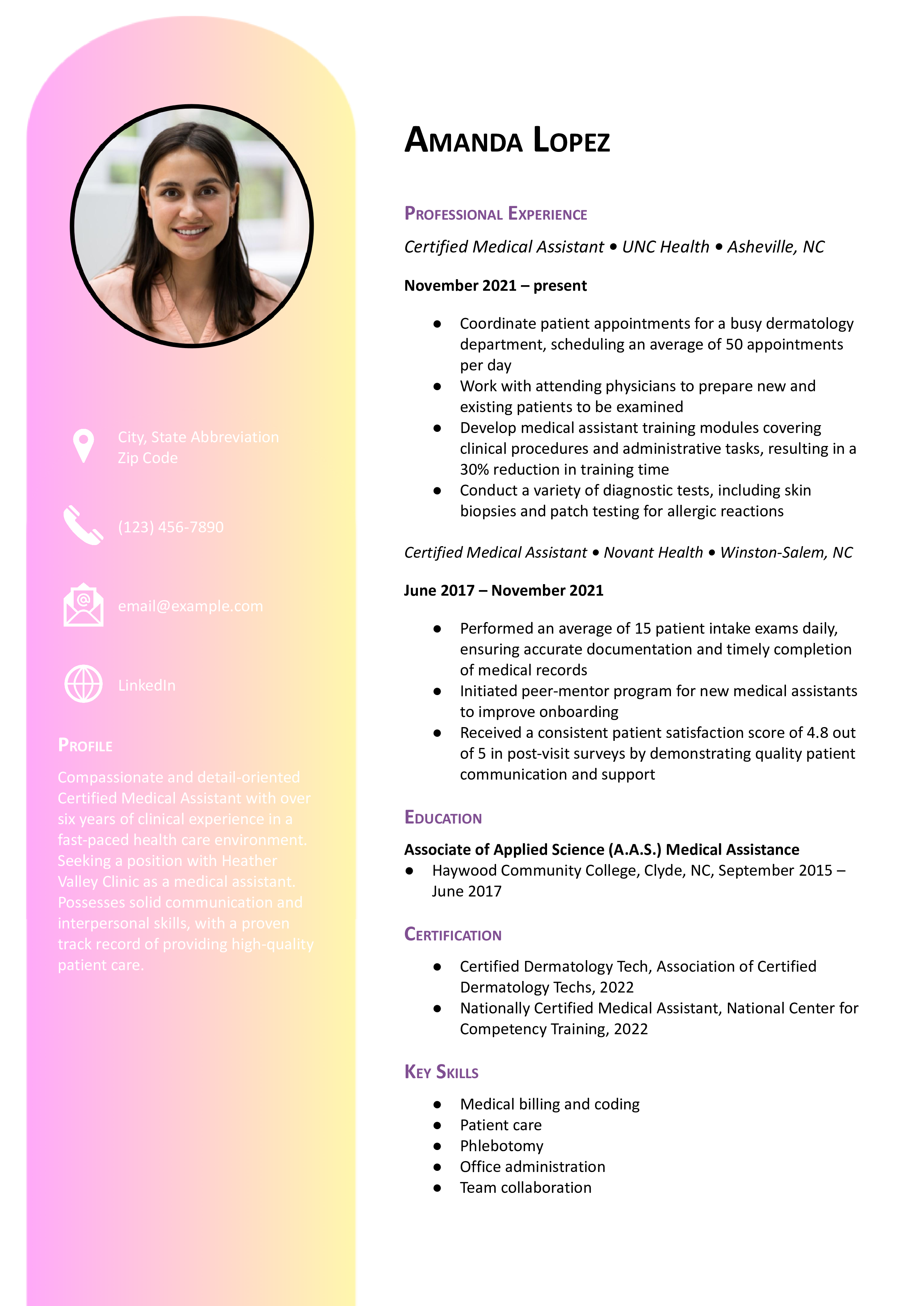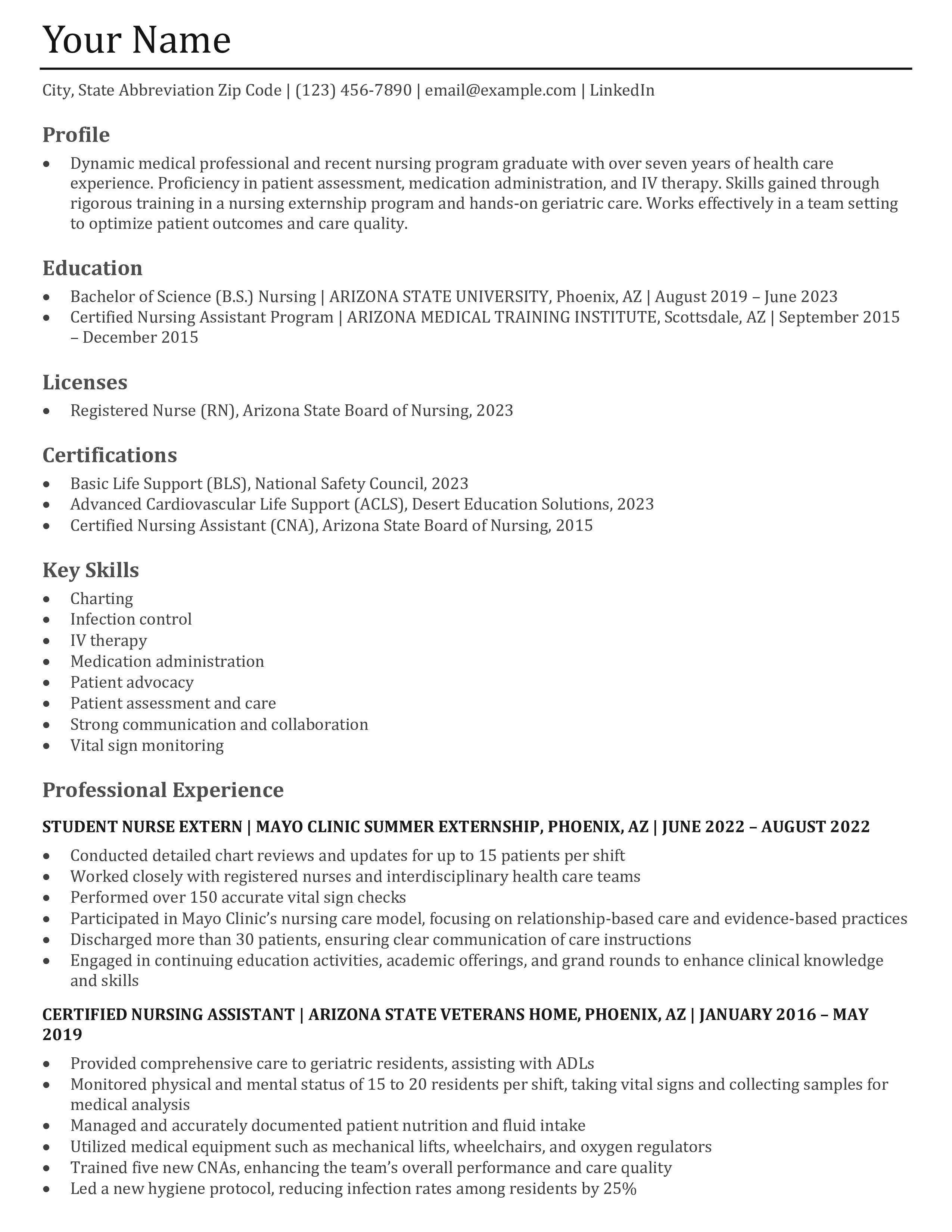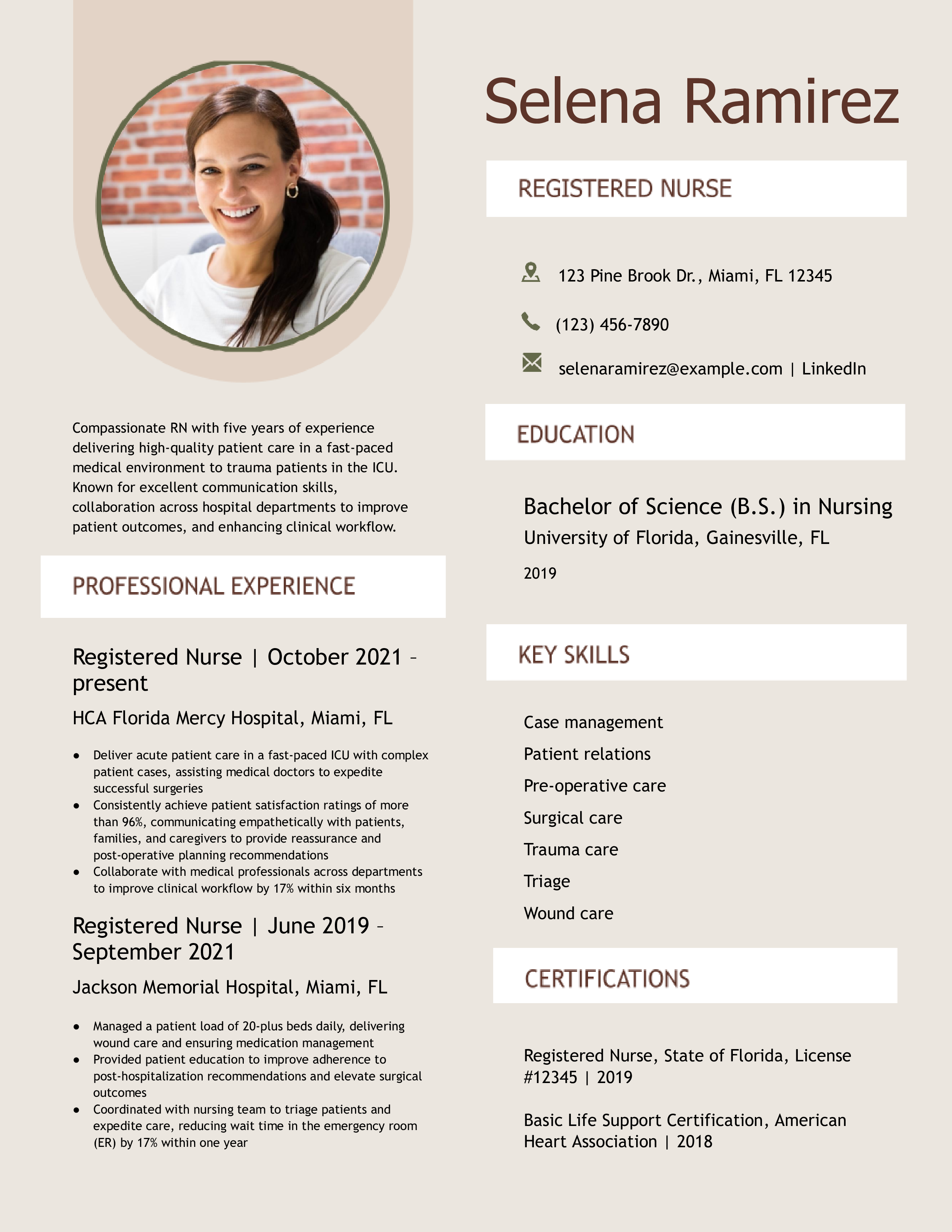Your certified nursing assistant (CNA) resume should prove to hiring managers that you can provide compassionate care to patients and be their advocate. It must show they can count on you to collaborate with other health care professionals and support patients with their day-to-day needs. This guide will provide you with strategies to create an effective resume featuring the best of your CNA career.
Key takeaways:
- Highlight any specializations: Your resume’s first paragraph should quickly mention any skills or areas of expertise in things such as home health, rehabilitation, or long-term care (LTC) facilities. Describe what makes you stand out.
- Quantify achievements: Using numbers helps hiring managers envision your impact in past CNA positions. Instead of only listing job duties, use percentages and other metrics to describe accomplishments like satisfaction scores and efficiency improvements.
- Include keywords for ATS: Incorporate keywords and phrases from the job description throughout your resume in a natural way. This helps your document perform well within Applicant Tracking Systems (ATS) and stand out from other well-qualified CNAs.
Certified Nursing Assistant Resume Examples and Templates (Downloadable)
CNA Resume (No Experience) Resume Example
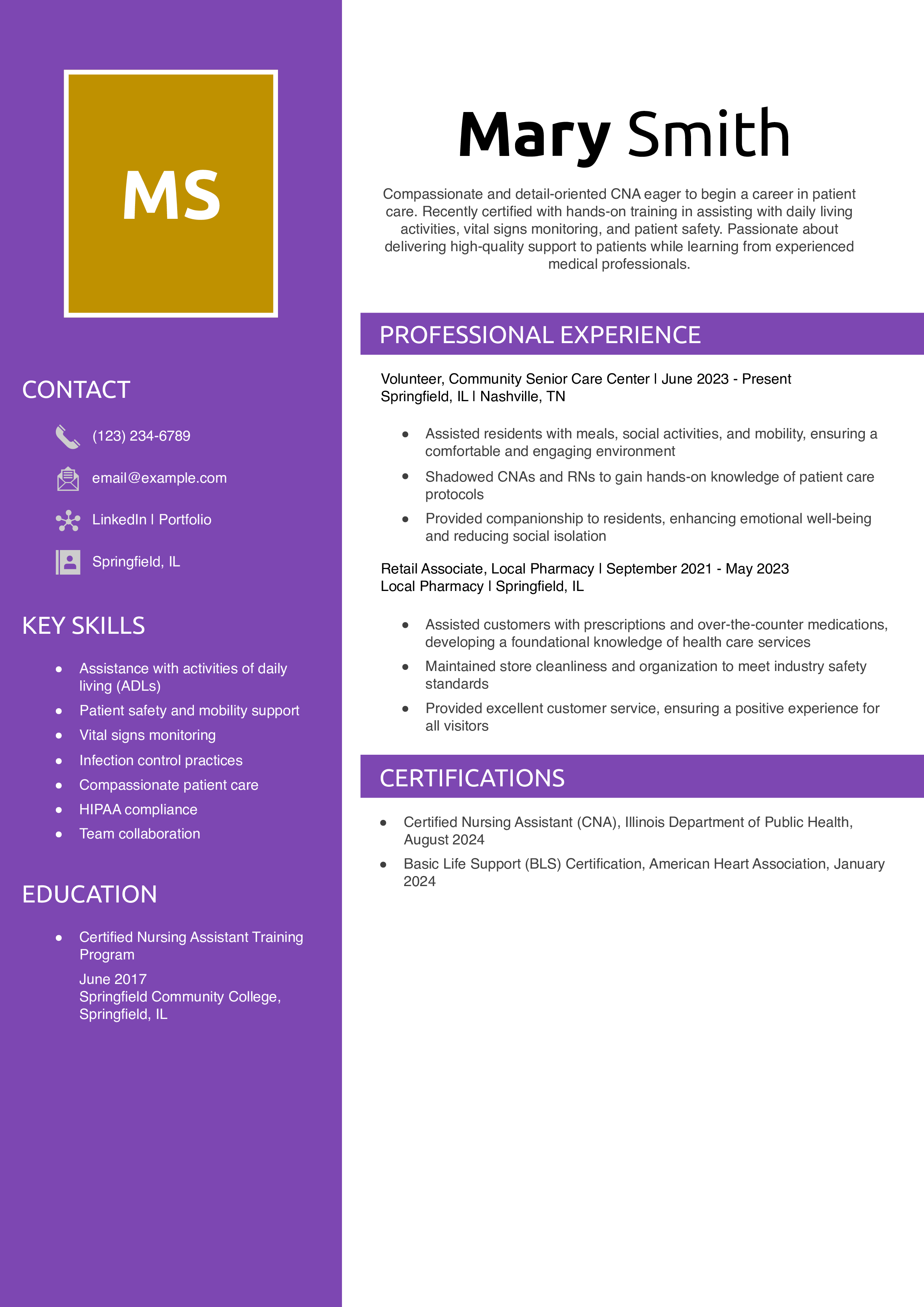
Why This Resume Is a Great Example
This resume is perfect for a new CNA with no experience because it highlights transferable skills and volunteer work in a health care setting. It also shows initiative by including a relevant volunteer role.
Key Tip:
Even if you don’t have formal CNA experience, include volunteer work, internships, or related jobs that demonstrate patient care skills. Learn how to build a strong entry-level resume here: How to Write a Resume with No Experience
CNA Resume (With Experience) Resume Example
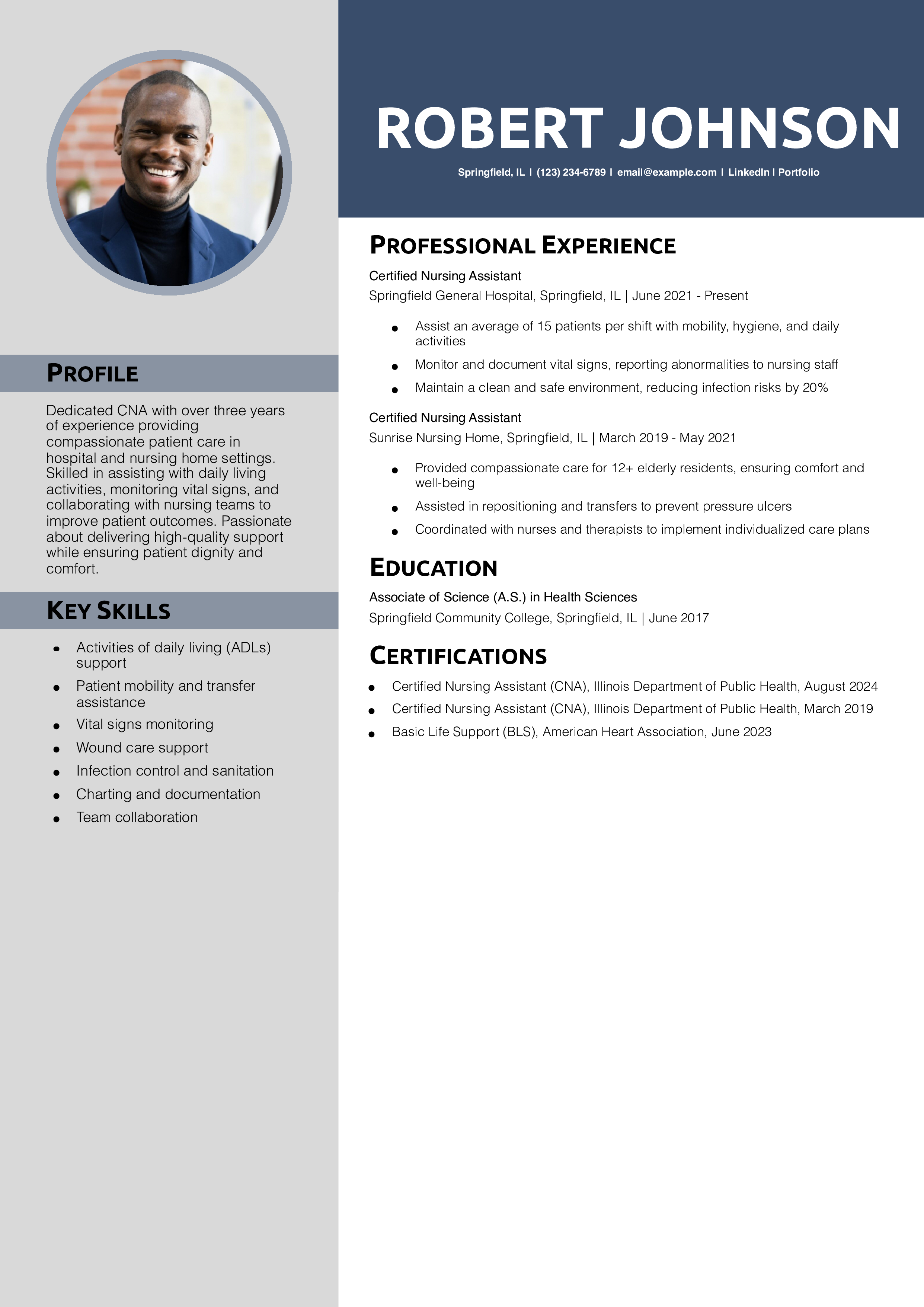
Why This Resume Is a Great Example
This resume highlights hands-on experience in hospital and nursing home settings, showing progression in skills and responsibilities. It also quantifies key tasks, such as assisting “15 patients per shift.”
Key Tip:
Use numbers to show impact—hiring managers love quantifiable data! Learn more here: How to List Work Experience on a Resume
Acute Care CNA Resume Example
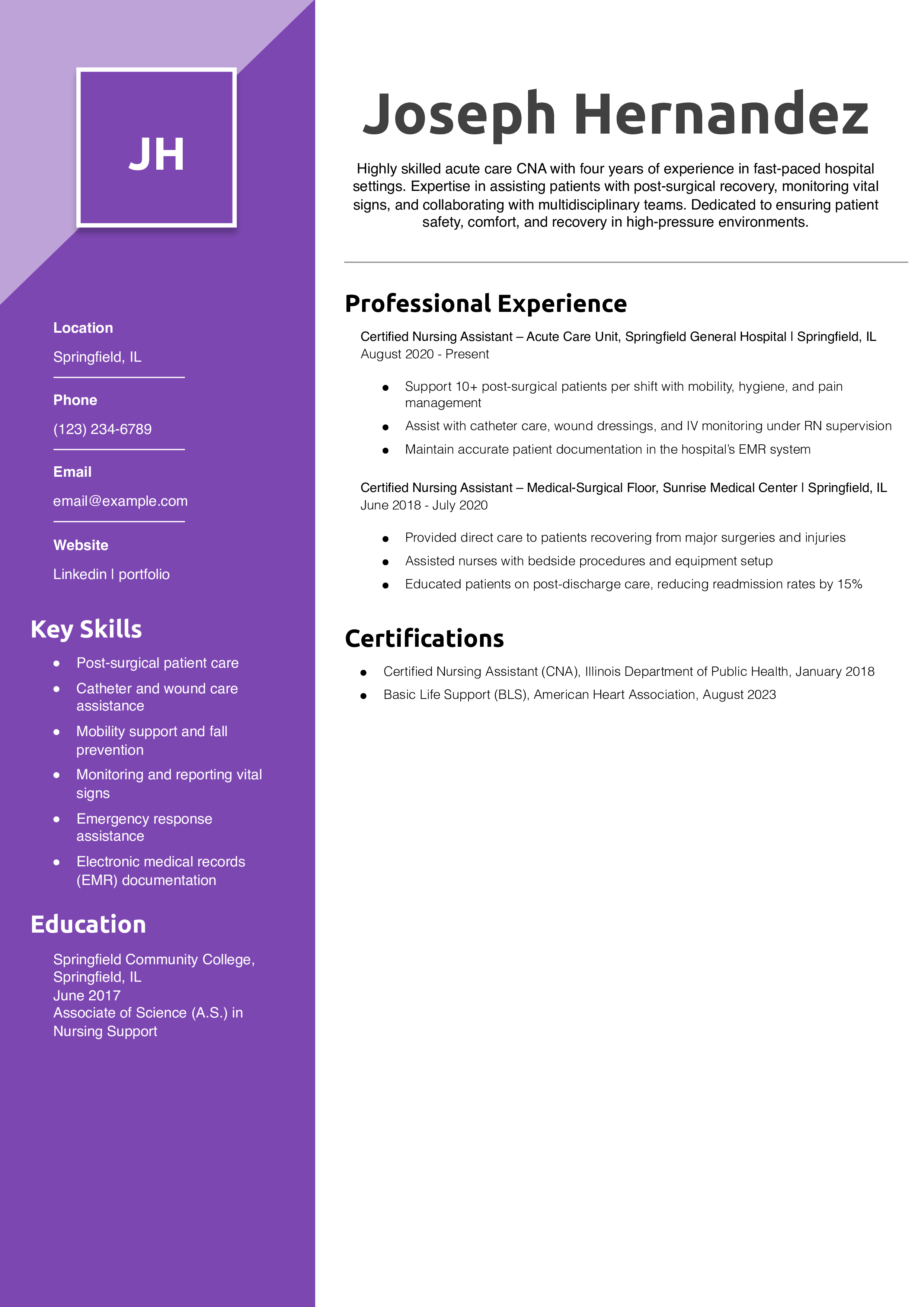
Why This Resume Is a Great Example
This resume showcases acute care experience with specific hospital duties like post-surgical support and catheter care. It also includes EMR documentation—a must-have skill for hospital CNAs.
Key Tip:
Emphasize specialized experience when applying for acute care roles. Learn how to tailor your resume for job descriptions here: How to Tailor a Resume to a Job
CNA Instructor Resume Example
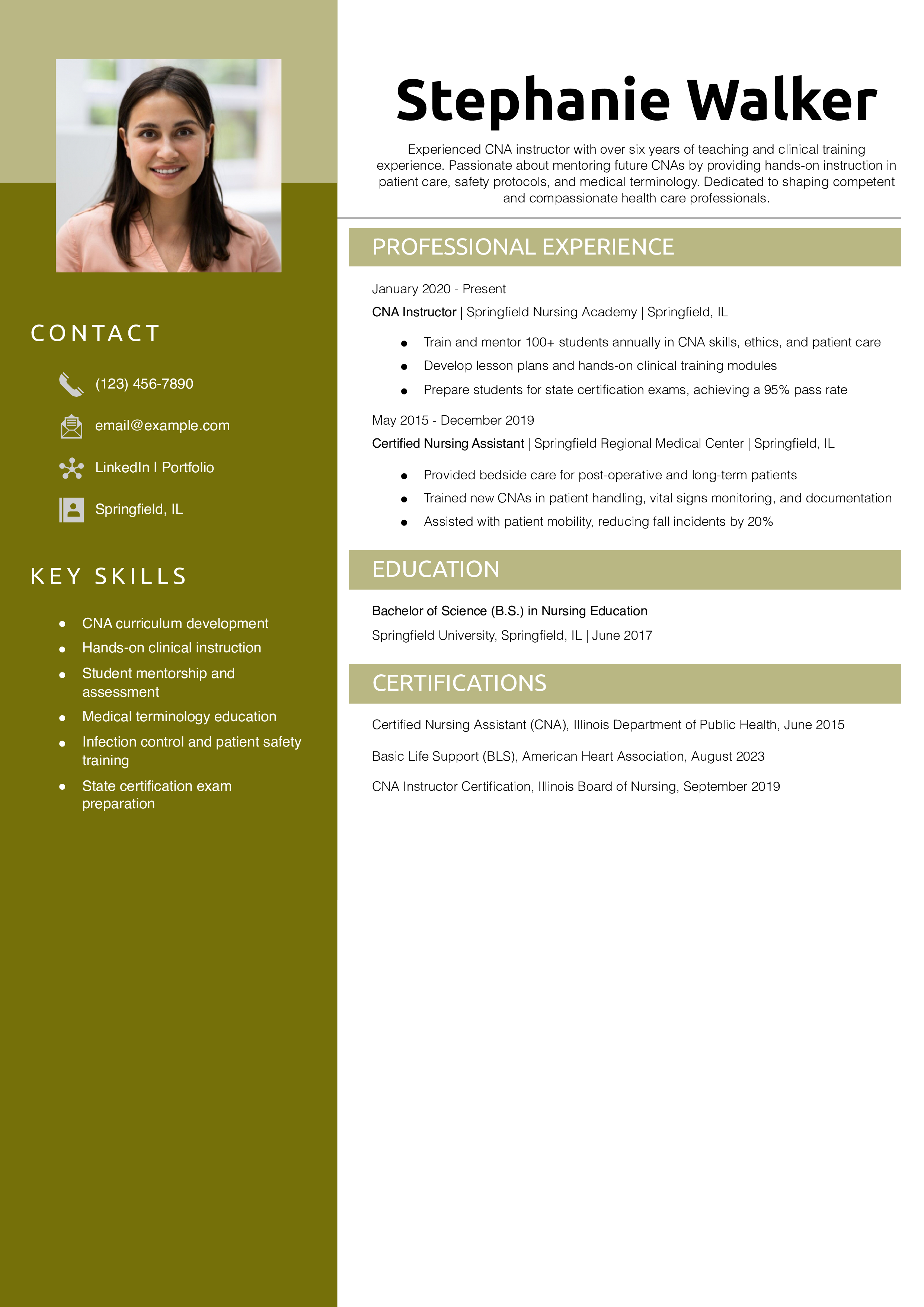
Why This Resume Is a Great Example
This resume successfully transitions from clinical CNA work to teaching, emphasizing leadership, curriculum development, and student success rates.
Key Tip:
If applying for an instructor role, highlight mentorship, training, and curriculum development. Learn how to present teaching experience here: Resume Keywords for Education Roles
CNA Supervisor Resume Example
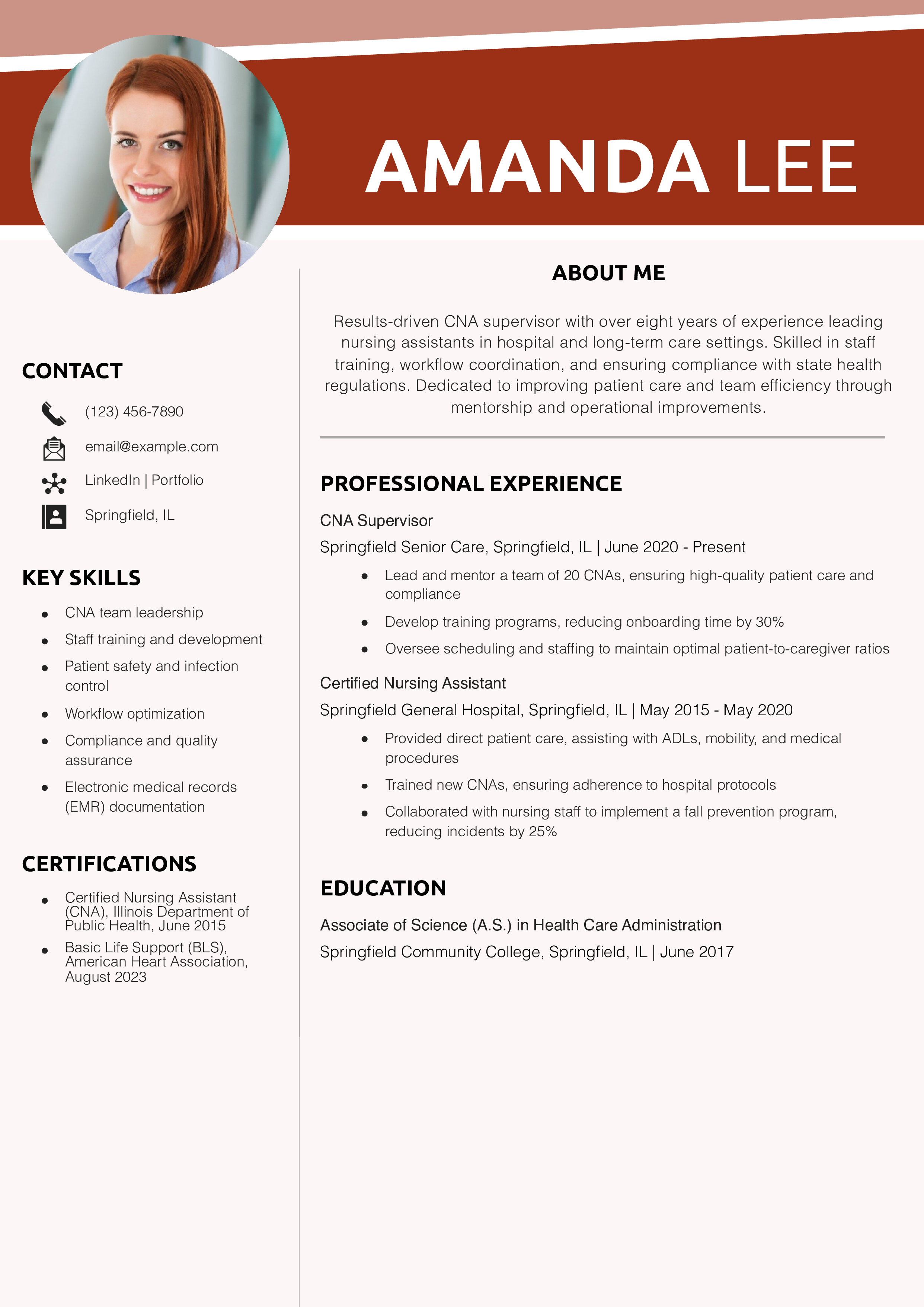
Why This Resume Is a Great Example
This resume highlights leadership skills and staff management experience, which are essential for a CNA supervisor role. The candidate also quantifies impact, such as reducing onboarding time by 30%.
Key Tip:
If you’re moving into a supervisory role, emphasize leadership experience. Learn how to showcase management skills here: How to List Leadership Skills on a Resume
Hospice CNA Resume Example
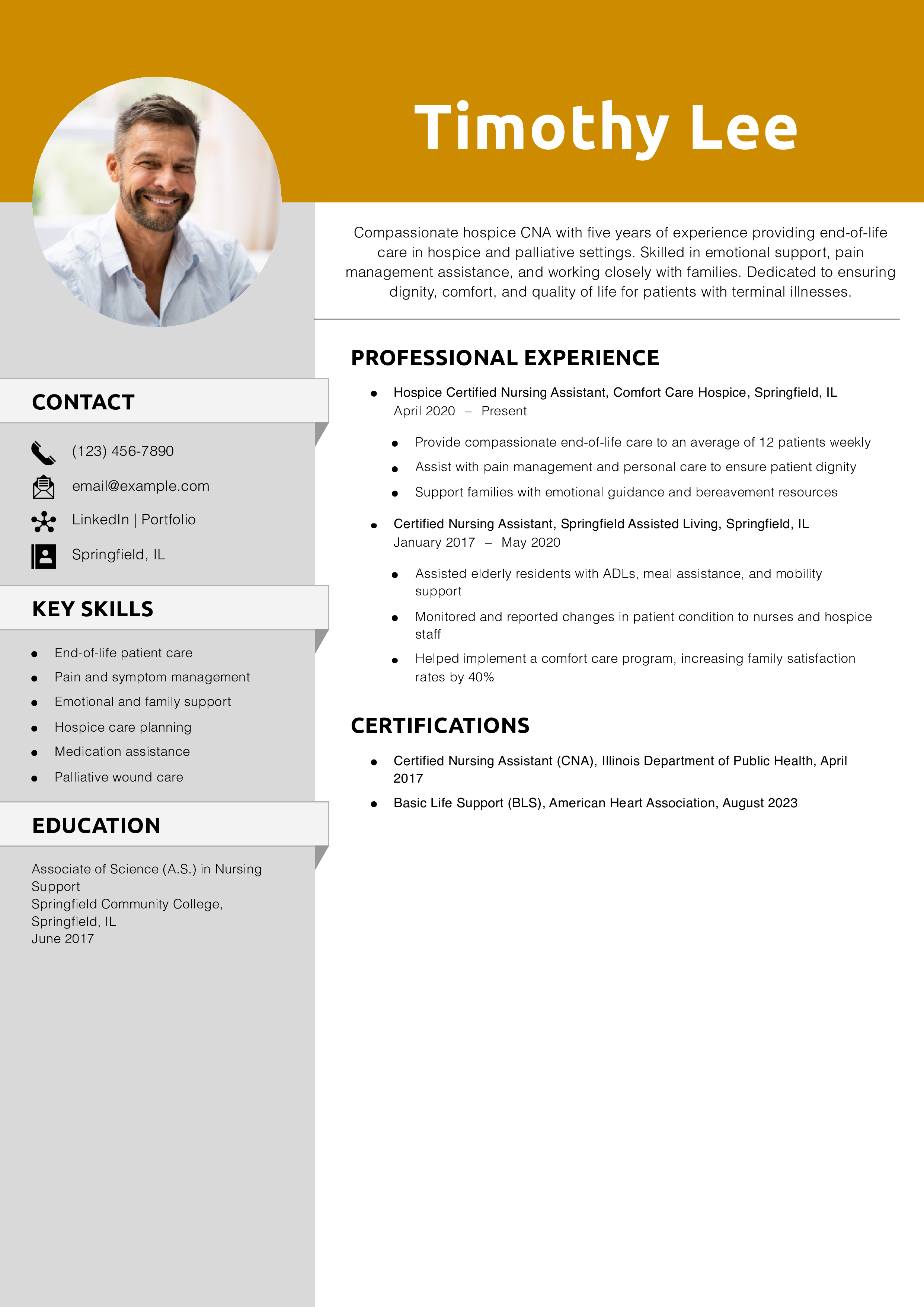
Why This Resume Is a Great Example
This resume focuses on hospice-specific skills, such as pain management and family support. It also includes quantifiable patient impact to strengthen credibility.
Key Tip:
Hospice CNAs should highlight both technical skills and emotional support capabilities. Learn how to emphasize soft skills here: How to Showcase Compassion and Empathy on a Resume
Lead CNA Resume Example
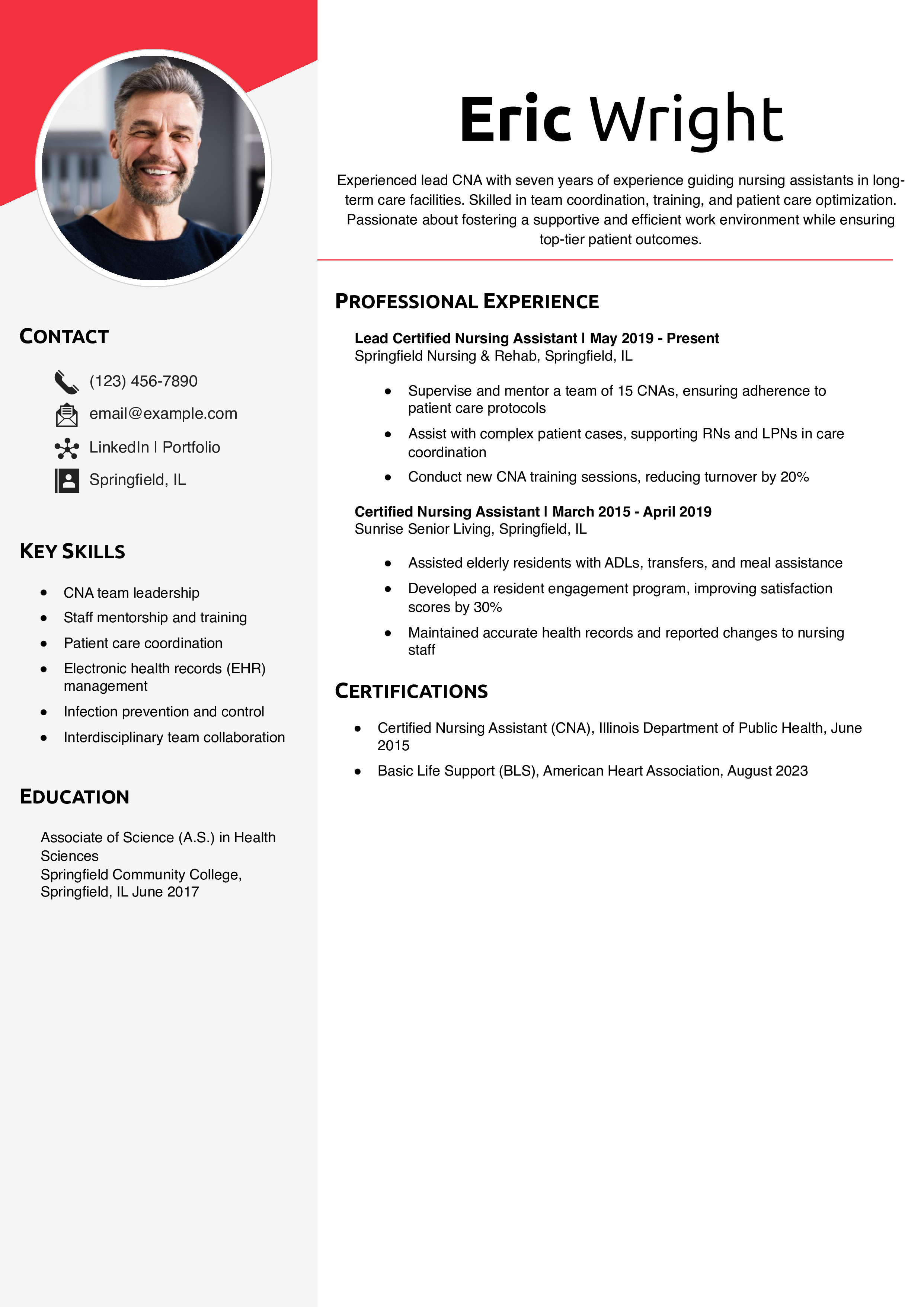
Why This Resume Is a Great Example
This resume demonstrates leadership experience in a CNA role, emphasizing mentorship and team efficiency. The candidate also highlights contributions to staff retention and patient satisfaction.
Key Tip:
If applying for a lead CNA role, showcase leadership, training, and efficiency improvements. Learn more here: How to Highlight Leadership on a Resume
Home Health CNA Resume Example
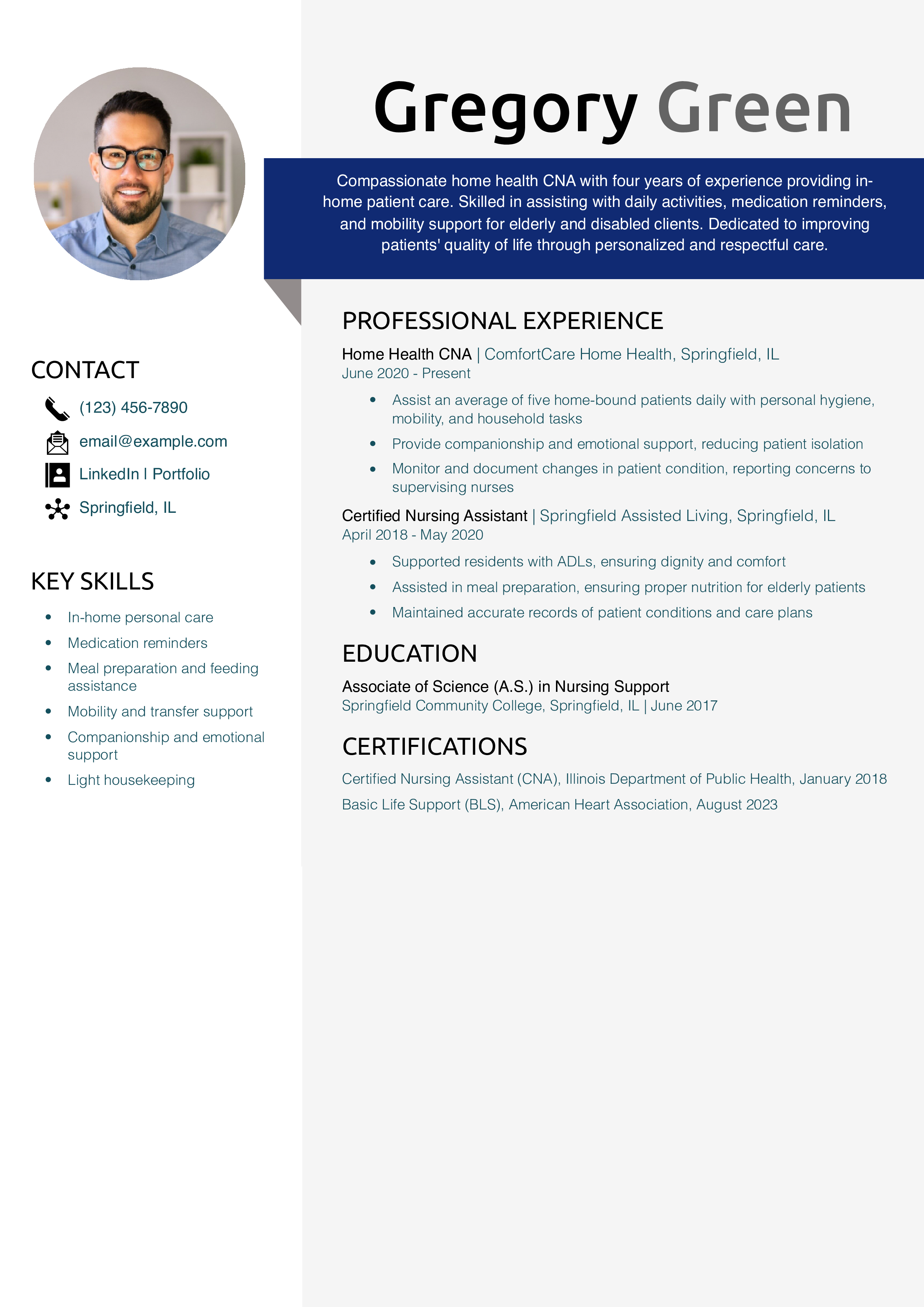
Why This Resume Is a Great Example
This resume focuses on home health care expertise, emphasizing independent caregiving and patient companionship. It highlights key skills such as medication reminders and household support, which are essential in home health roles.
Key Tip:
When applying for home health roles, emphasize self-sufficiency and trustworthiness. Learn how to tailor your resume for in-home care roles here: How to List Home Health Experience on a Resume
Skilled Nursing Facility CNA Resume Example
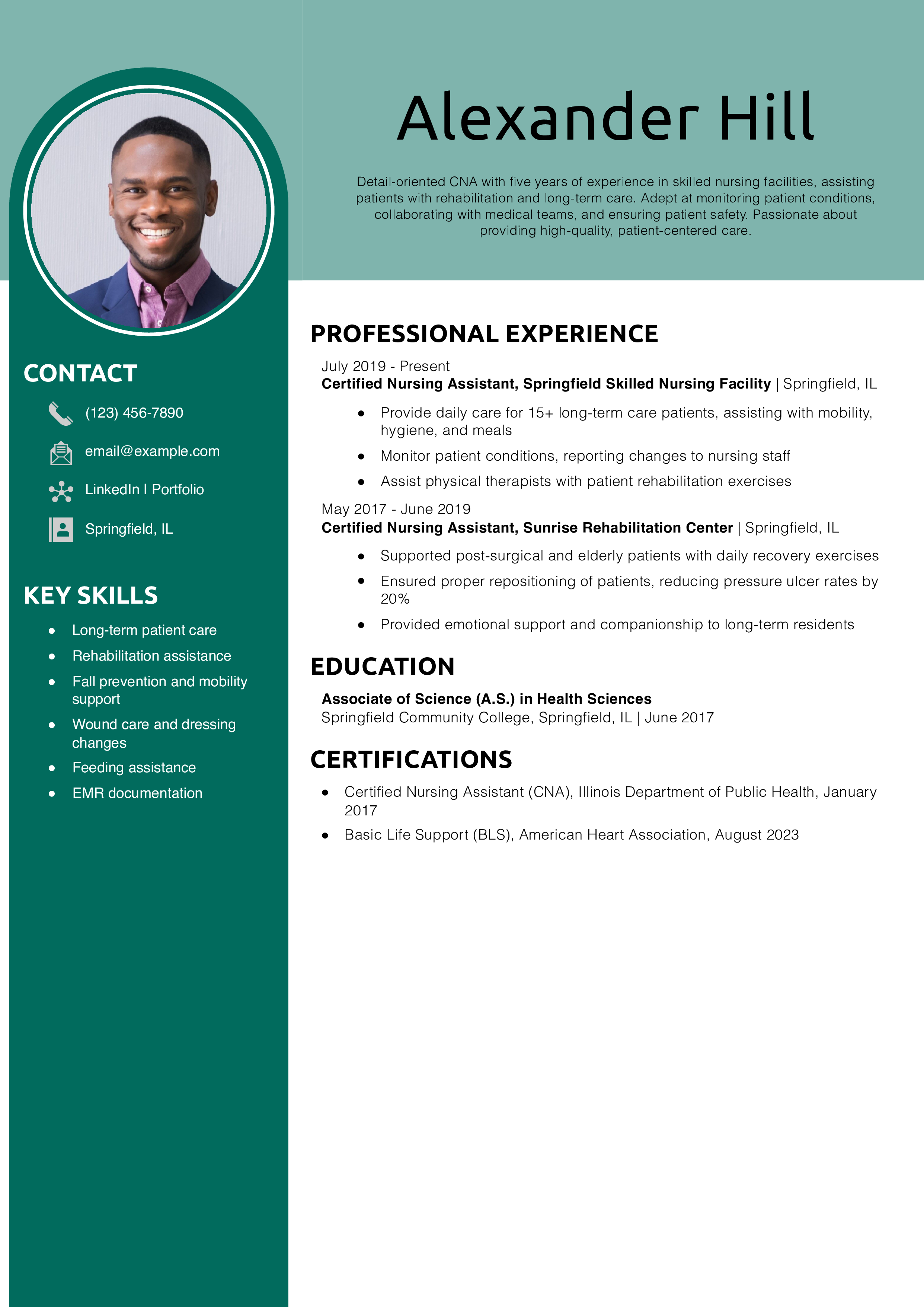
Why This Resume Is a Great Example
This resume highlights skilled nursing facility (SNF) experience, showcasing rehabilitation support and long-term care expertise. The candidate demonstrates impact with quantifiable improvements in patient care.
Key Tip:
If applying for SNF roles, highlight rehabilitation, mobility support, and fall prevention. Learn how to structure your experience effectively here: Best Resume Formats
Pediatric CNA Resume Example
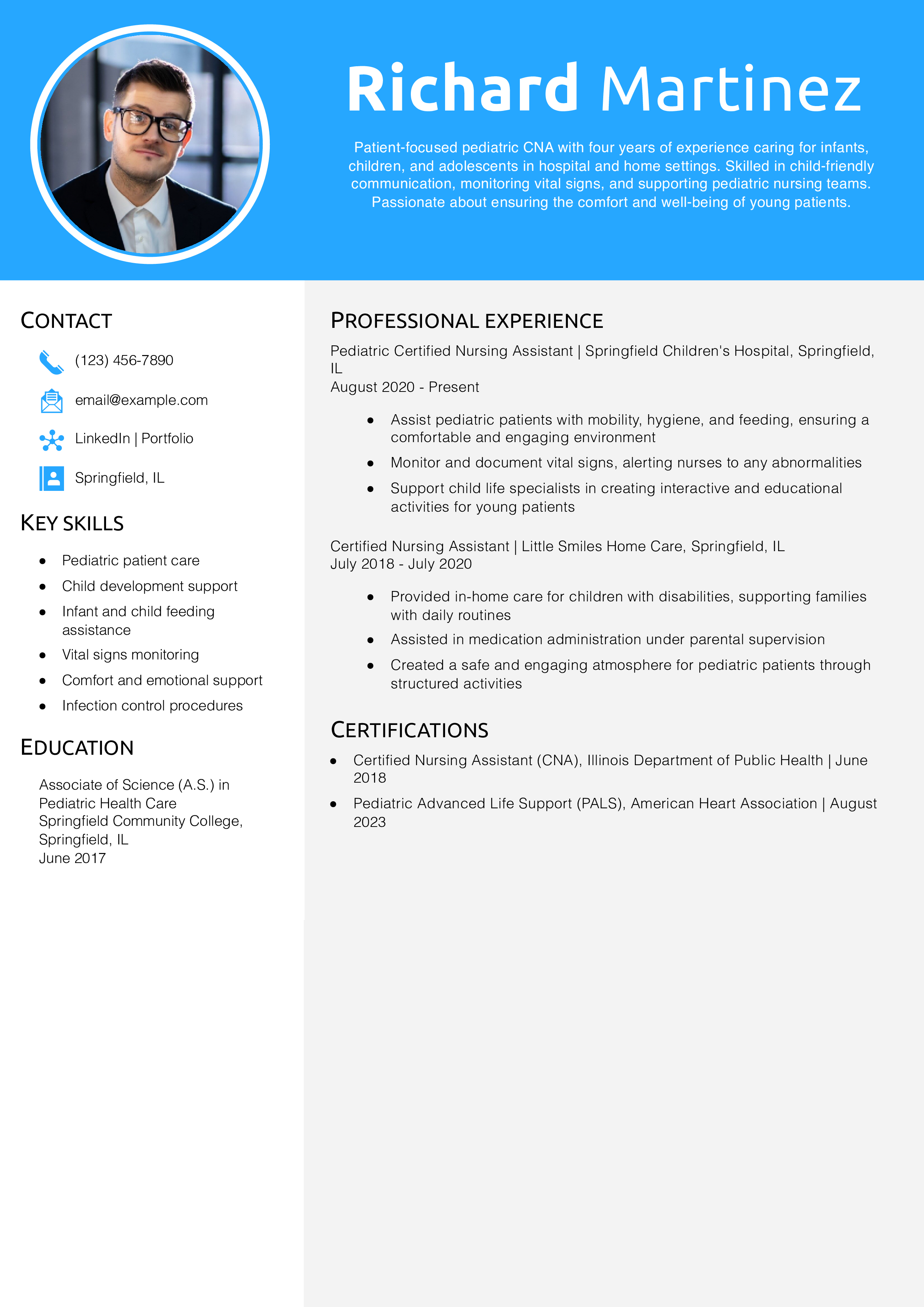
Why This Resume Is a Great Example
This resume focuses on pediatric CNA skills, emphasizing child-friendly patient care and specialized training in pediatric health. It also highlights experience in both hospital and home settings.
Key Tip:
If applying for pediatric CNA roles, emphasize child development, infant care, and parent communication. Learn how to highlight relevant skills here: How to List Skills on a Resume
Hospital CNA Resume Example
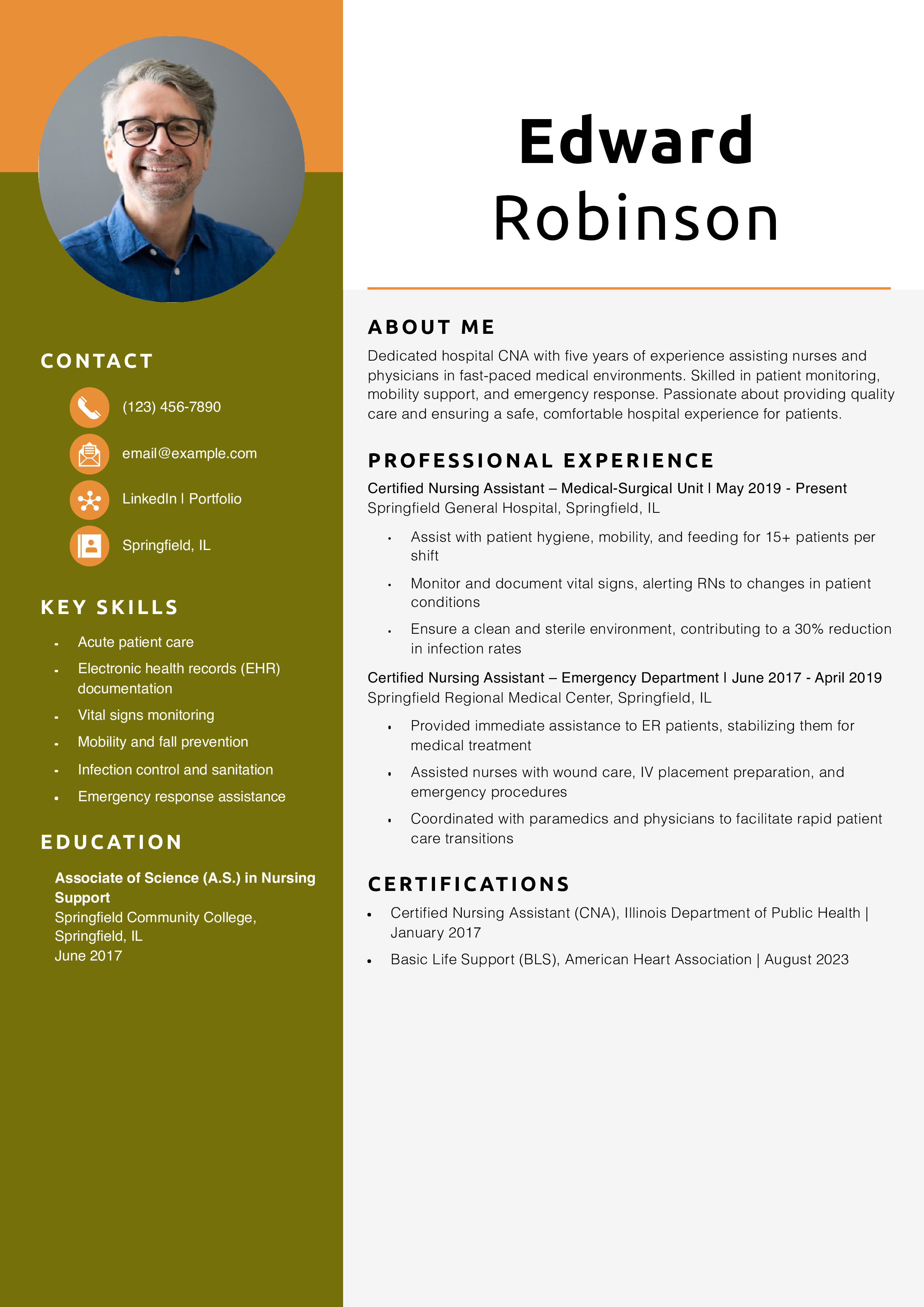
Why This Resume Is a Great Example
This resume focuses on hospital CNA duties, emphasizing fast-paced acute care skills like emergency response and infection control. The candidate also showcases experience across multiple hospital units.
Key Tip:
If applying for hospital CNA roles, highlight adaptability and acute care experience. Learn how to align your resume with job descriptions here: How to Tailor a Resume to a Job
Rehabilitation Center CNA Resume Example
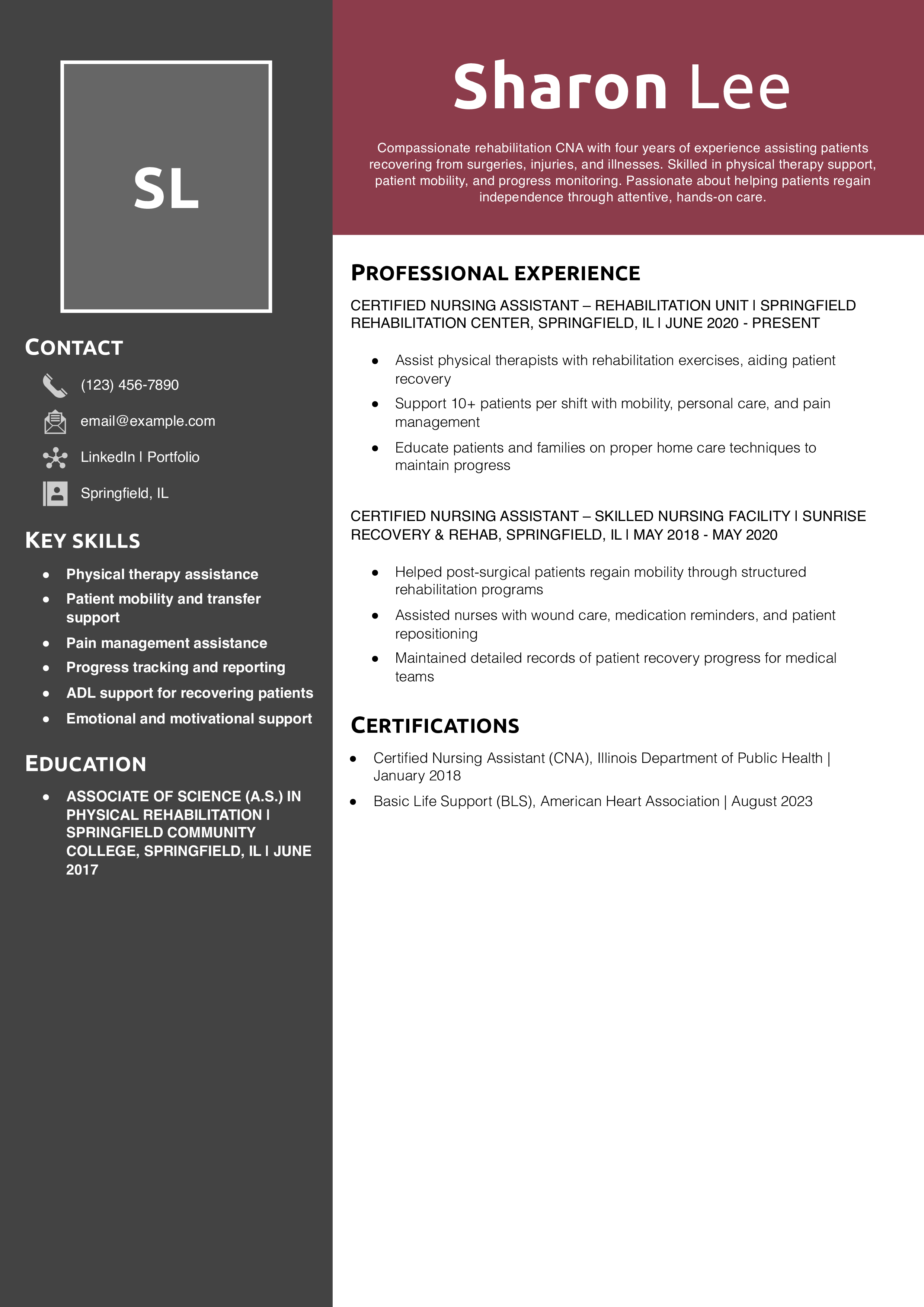
Why This Resume Is a Great Example
This resume focuses on rehabilitation and recovery patient care, highlighting physical therapy support and progress tracking. It also demonstrates direct collaboration with therapists.
Key Tip:
If applying for rehab CNA roles, emphasize mobility support and recovery-focused skills. Learn how to showcase specialized skills here: How to List Skills on a Resume
Long-Term Care CNA Resume Example
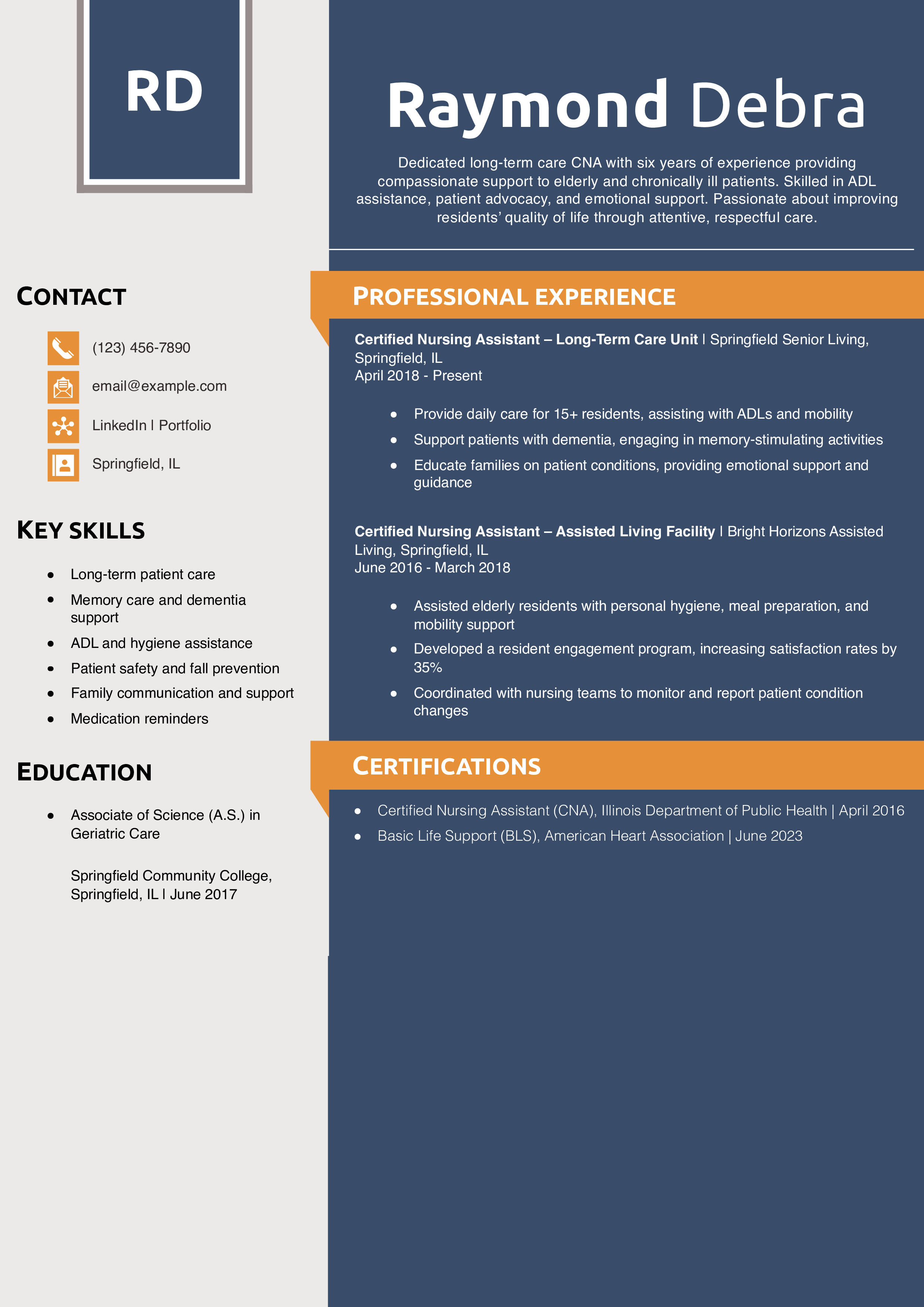
Why This Resume Is a Great Example
This resume focuses on long-term care expertise, emphasizing dementia care, ADL support, and family communication. The candidate also highlights resident engagement efforts.
Key Tip:
If applying for long-term care roles, showcase experience in patient advocacy and dementia support. Learn how to structure a compelling resume here: Best Resume Formats
Emergency Room CNA Resume Example
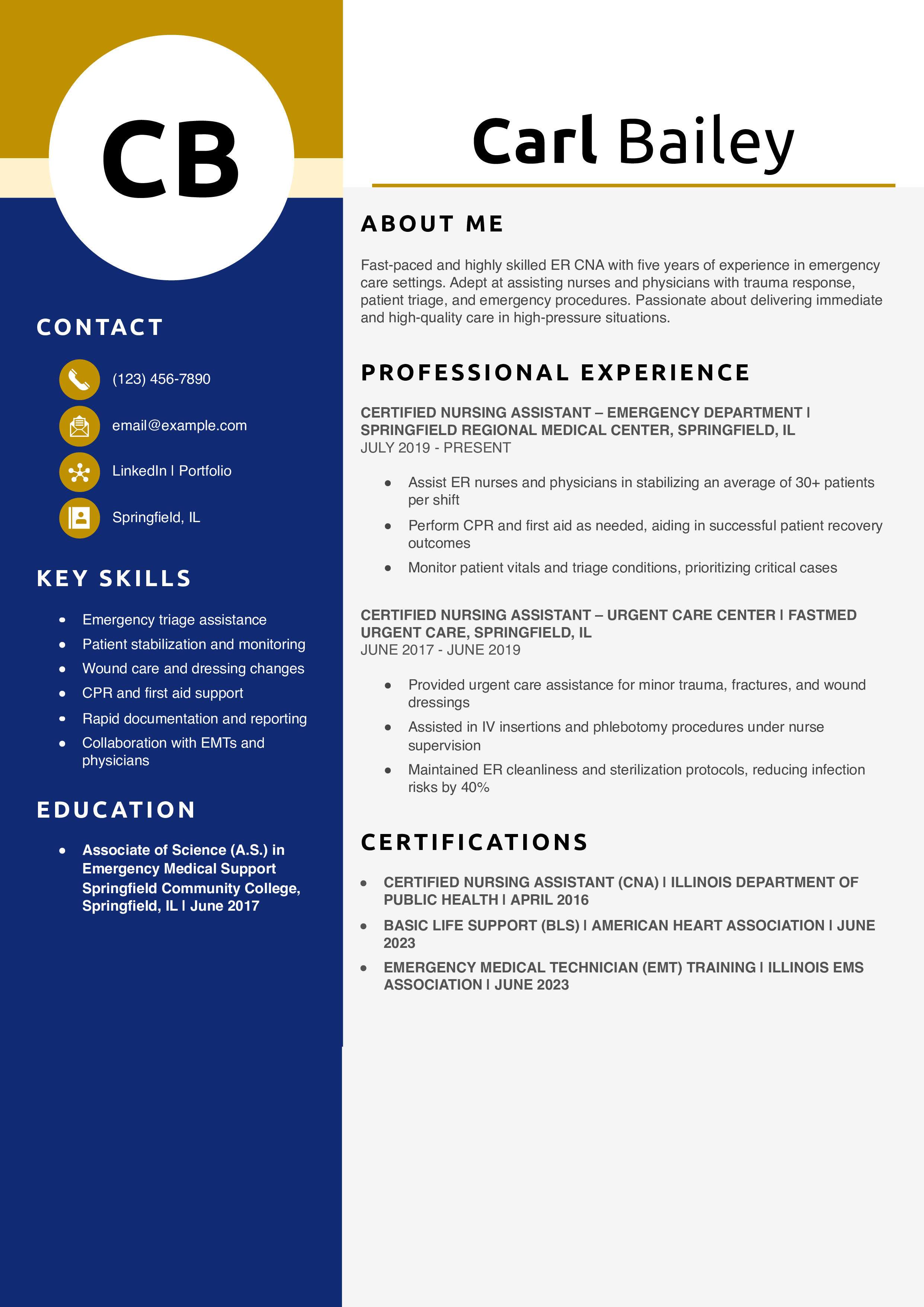
Why This Resume Is a Great Example
This resume highlights emergency medical care skills and experience in fast-paced hospital settings. The candidate also showcases expertise in patient stabilization and trauma response.
Key Tip:
If applying for ER CNA roles, highlight triage, CPR, and emergency collaboration. Learn how to emphasize urgent care skills here: Resume Action Words
Assisted Living CNA Resume Example
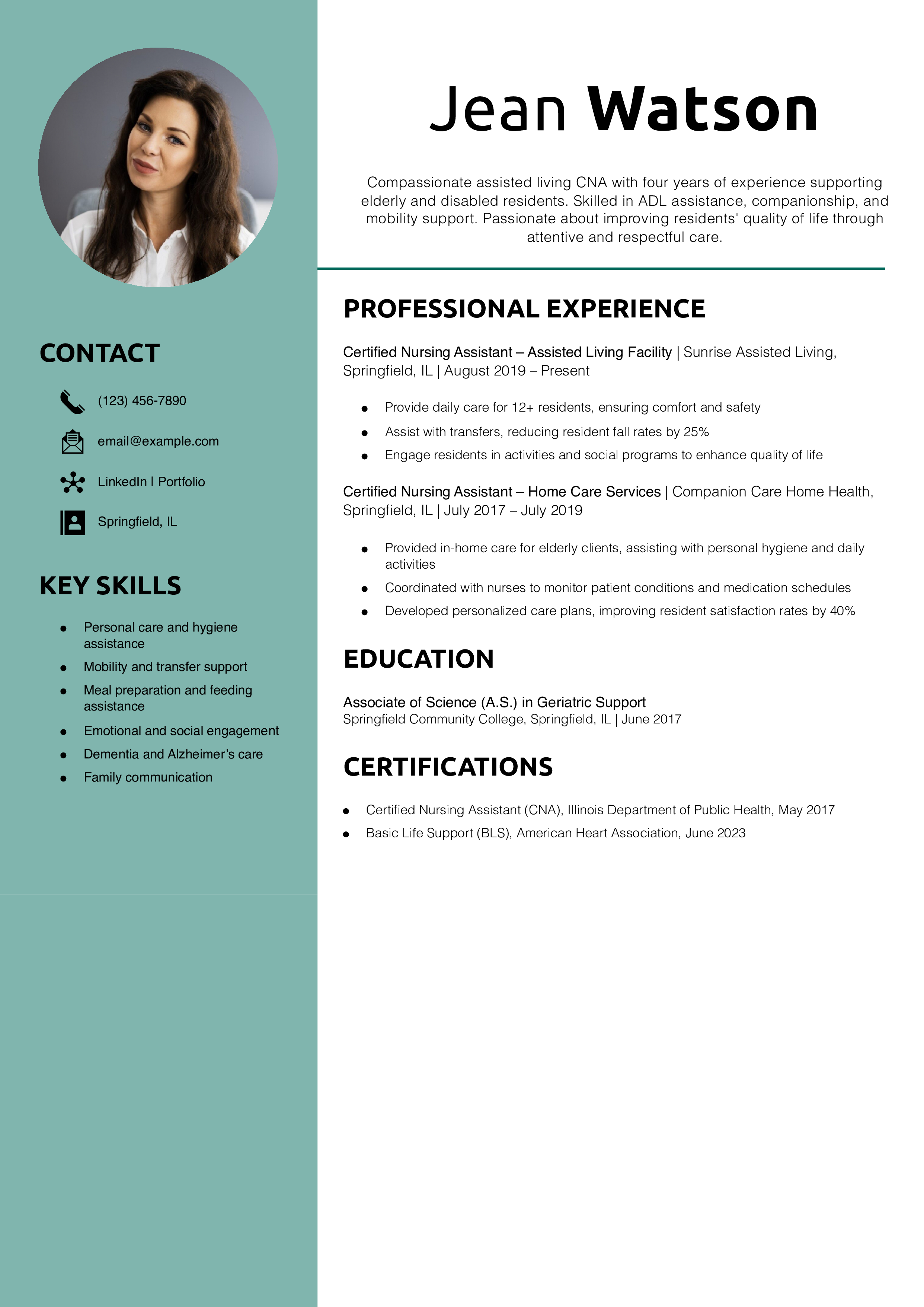
Why This Resume Is a Great Example
This resume focuses on assisted living facility care, emphasizing mobility assistance and social engagement. The candidate also highlights reducing fall risks and enhancing resident satisfaction.
Key Tip:
If applying for assisted living roles, highlight experience with dementia patients and ADL support. Learn more here: How to List Work Experience on a Resume
Travel CNA Resume Example
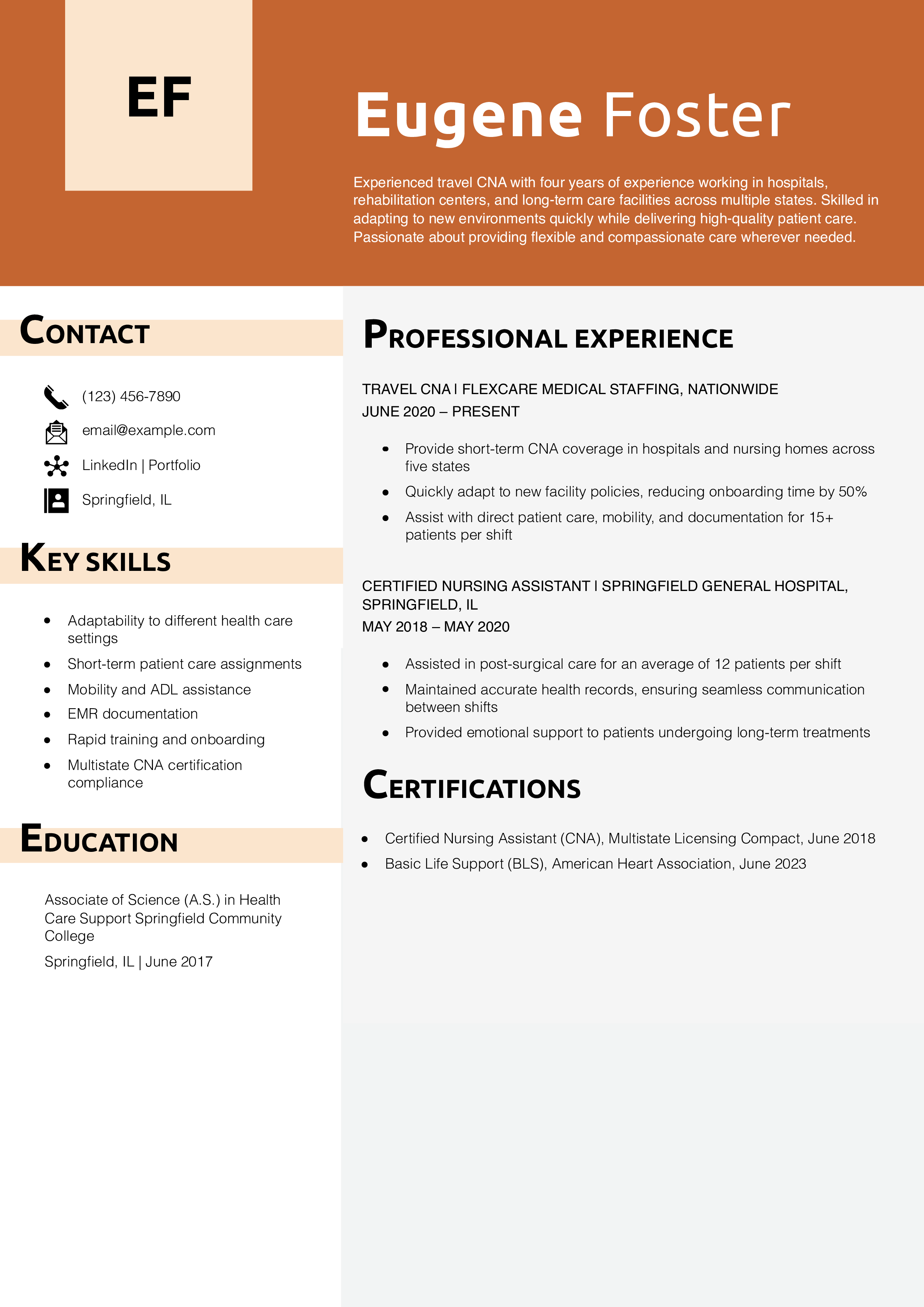
Why This Resume Is a Great Example
This resume emphasizes adaptability and multistate CNA experience, key qualifications for travel CNA positions. It also demonstrates quick onboarding and flexibility.
Key Tip:
If applying for travel CNA roles, highlight adaptability and multistate licensure. Learn more here: How Far Should a Resume Go?
Surgical CNA Resume Example
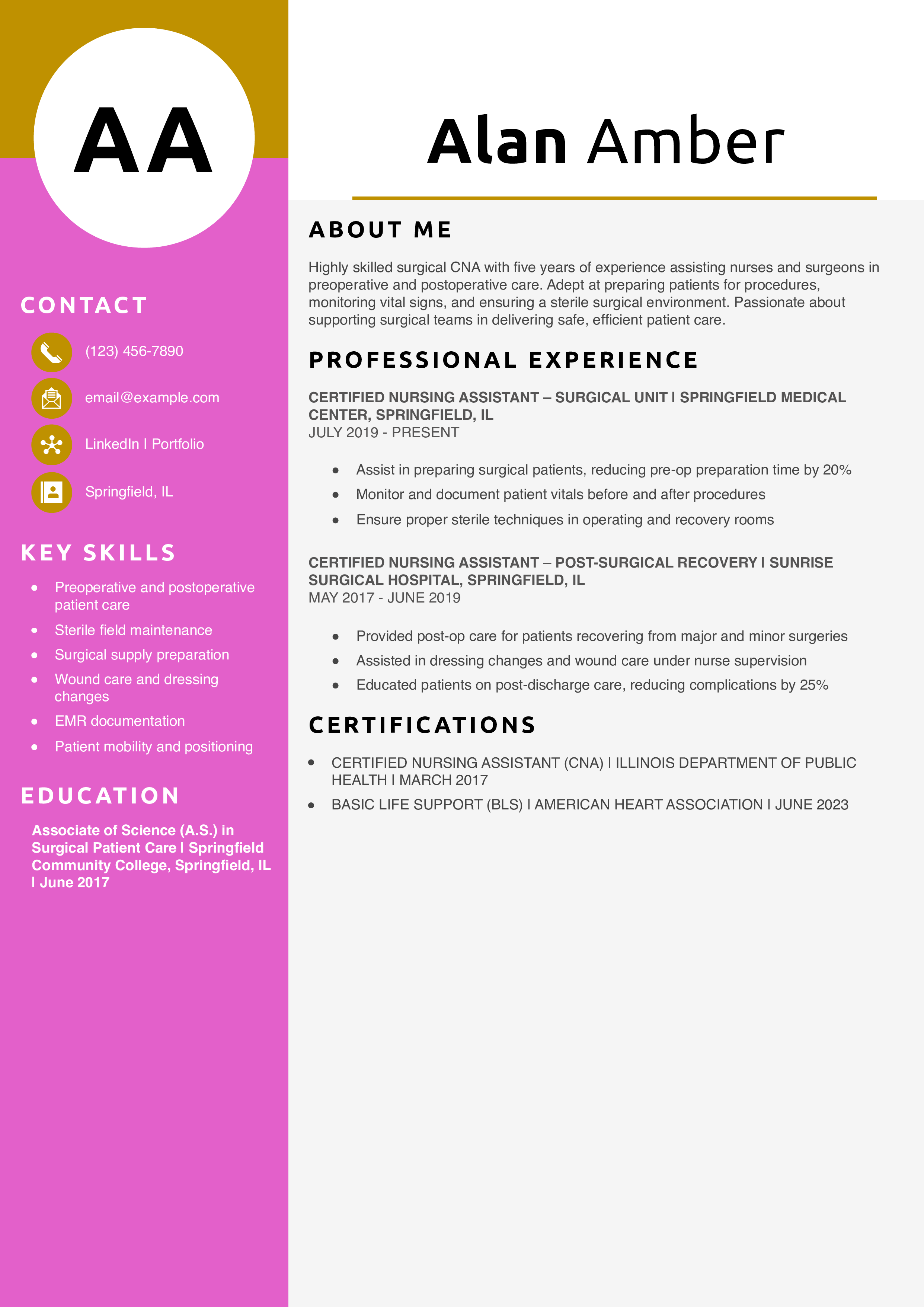
Why This Resume Is a Great Example
This resume highlights surgical and post-op care expertise, demonstrating proficiency in sterile field maintenance and patient monitoring.
Key Tip:
If applying for surgical CNA roles, showcase experience in patient preparation and recovery support. Learn more here: How to List Certifications on a Resume
Cardiac Care CNA Resume Example
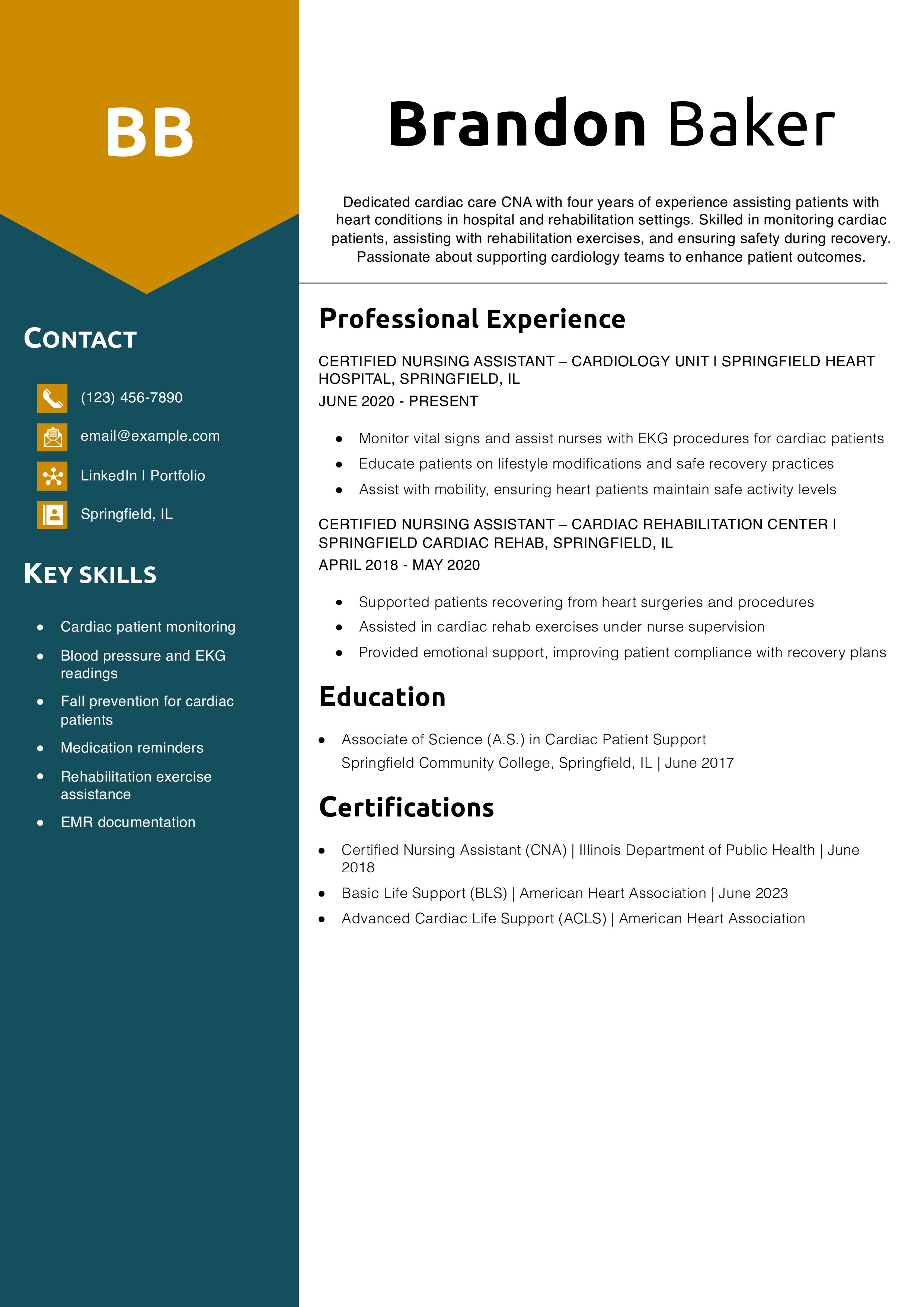
Why This Resume Is a Great Example
This resume focuses on cardiac care expertise, showcasing rehabilitation assistance and cardiac patient monitoring. It also includes specialized certifications like ACLS.
Key Tip:
If applying for cardiac CNA roles, highlight experience with monitoring vitals and supporting rehab efforts. Learn more here: How to Showcase Health Care Experience on a Resume
Oncology CNA Resume Example
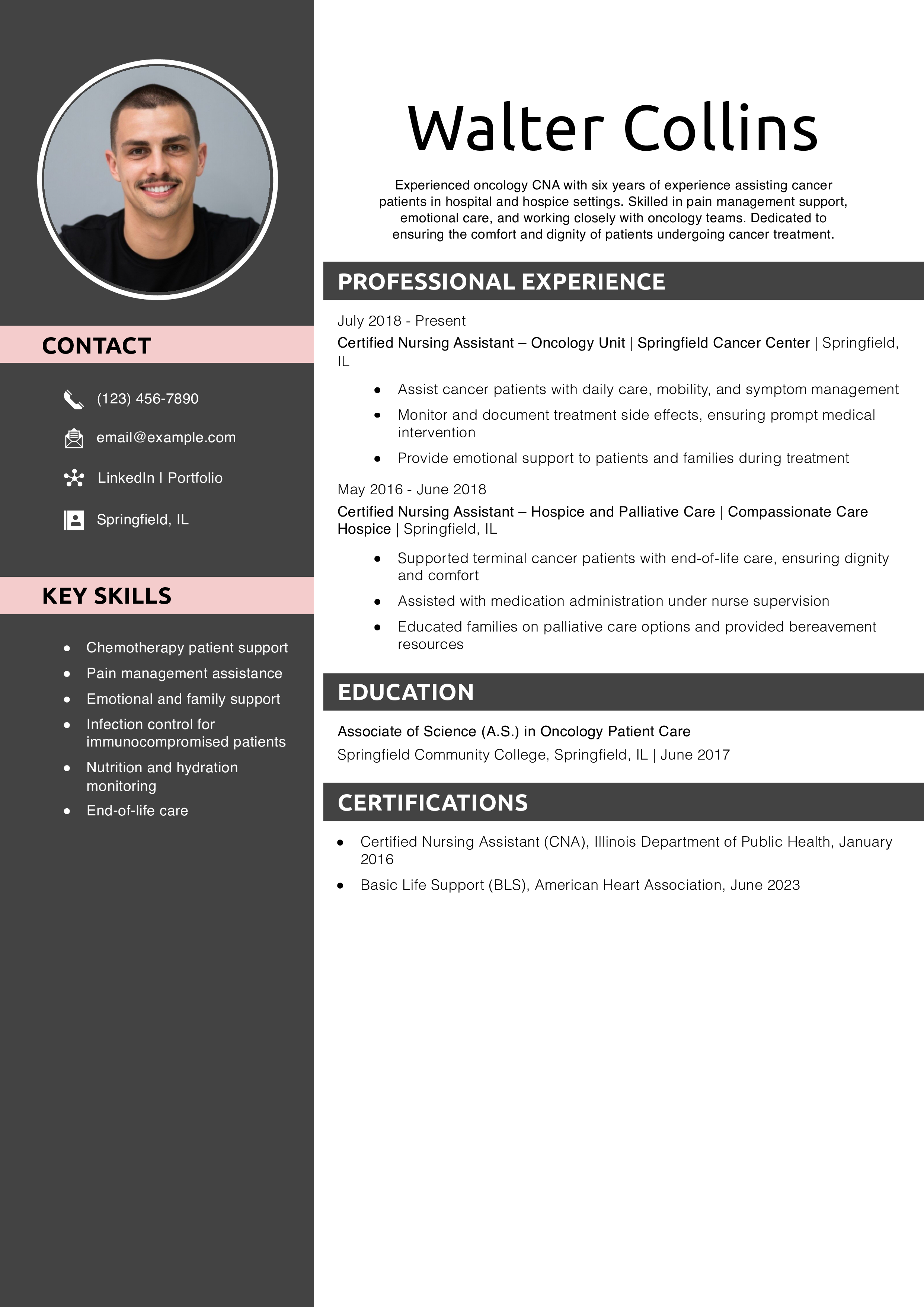
Why This Resume Is a Great Example
This resume highlights specialized oncology experience, emphasizing pain management, chemotherapy support, and emotional care.
Key Tip:
If applying for oncology CNA roles, emphasize experience with palliative care and patient advocacy. Learn more here: Resume Personal Statement Examples
Certified Nursing Assistant Text-Only Resume Examples and Templates
How To Write a Certified Nursing Assistant Resume Example
To demonstrate that you’re the right CNA for the job, your resume must emphasize the most compelling highlights of your career. Start by ensuring your template includes the following sections:
- Contact information
- Profile
- Key skills
- Professional experience
- Education and certifications
1. Share your contact information
Provide potential employers with your most recent contact information so they can reach out to schedule an interview. At the top of your resume, include your full name, phone number, email address, and location. You can also insert a link to your LinkedIn profile page if you have one.
Example
Your Name
(123) 456-7890
[email protected]
City, State Abbreviation Zip Code
LinkedIn
2. Write a brief summary of your certified nursing assistant qualifications
If you only had one paragraph to tell hiring managers what you offer, what would you say? This is how you need to think about your resume profile. It should summarize your relevant CNA experience, skills, and qualifications in a few sentences. Also, mention any extensive experience you have in a specialty or department, especially if it’s relevant to the new job.
Consider what makes you unique as a CNA. Maybe you’re great at calming anxious patients, or have a knack for working with children. Highlight your personal strengths and remember to be intentional with the information you include. Understand what the health care organization is looking for to have the biggest impact.
Senior-Level Profile Example
CNA team leader with over a decade of progressive experience in medical-surgical and senior living facilities. Focused on decreasing staff turnover through intentional mentorship. Known for managing complex patient care needs and providing end-of-life support with integrity.
Entry-Level Profile Example
Patient-focused CNA equipped with nearly two years of hands-on support in routine and high-risk births. Leverages phlebotomy certification to collect and process blood samples with care and dignity. Passionate about advocating for the needs of new mothers and their babies to ensure safety and well-being.
3. Create a powerful list of your certified nursing assistant experience
Your professional experience section is like the highlight reel of your CNA career. Include your last two to three positions and outline what you accomplished in each role. From helping with activities of daily living (ADLs) to speaking up on behalf of your patients, describe key responsibilities in a way that shows the scope and scale of your work.
You’ve cultivated a wide range of technical skills within your training and experience. However, the way in which you care for patients is just as important. Emotional intelligence, empathy, resilience, and relational support are equally vital to your work. So, describe moments when you used these skills to educate patients and de-escalate tense situations.
Senior-Level Professional Experience Example
Certified Nursing Assistant Supervisor, Legacy Senior Living, Milwaukee, WI
June 2021 – present
- Supervise a team of 15 CNAs, maintaining an average patient satisfaction rating of 97%
- Ensure all team members meet annual continuing education requirements and remain up-to-date on all certifications
- Collaborate with human resources to reduce staff turnover by 20% through a redesign of the CNA onboarding and mentorship program
- Organize and lead over 25 staff training sessions each quarter on compliance, safety, and resident care best practices
Entry-Level Professional Experience Example
Certified Nursing Assistant, Valley Hospital, Tawas City, MI
July 2022 – present
- Support an average of 300 deliveries each year on the labor and delivery floor
- Collaborate with multidisciplinary providers during complicated births to ensure proper monitoring and care for over 50 high-risk patients
- Reduce wait times for delivery rooms by 30% with a new room preparation initiative
- Restock supplies for all 25 rooms in the unit to maintain adequate inventory levels during every shift
Resume writer’s tip: Quantify your experience
To quantify your CNA experience, use numbers when you can to add depth and tangible evidence to your job descriptions. This strategy allows you to go beyond simply telling what you did and demonstrate the real, tangible proof of your CNA skills. Provide metrics that show how many patients you cared for and how much you improved patient satisfaction scores.
Do
- “Oversaw daily care for up to 15 post-surgery patients per shift with a focus on ADLs”
Don’t
- “Helped patients every day with basic needs”
Resume writer’s tip: Tailor your resume for each application
Study every job description you apply for and identify keywords, skills, and qualifications you match up with. Then, incorporate those specific terms and phrases throughout your resume. This lets hiring managers know that you made an effort to understand their health care organization and what they’re looking for in a CNA.
For example, suppose a job mentions a need for a CNA who can “provide specialized care for Alzheimer’s patients,” and you have this experience. In that case, you would work similar phrasing into your resume and mention specific times you’ve handled patients with dementia. Also, focus on key skills you have that align with those listed in the job description.
What if you don’t have experience?
As a certified medical professional, you’ve undergone a fair amount of training to even be considered eligible for CNA positions. This alone has given you the experience to highlight on your resume. Class projects, volunteer time, and hands-on coursework are all valuable.
In your education section, list a few relevant courses or mention any recognition you received during school. If your CNA program required a clinical rotation, detail the skills and unique experiences gained within that real health care setting.
4. Add certified nursing assistant education and certifications
Prove to hiring managers that you meet minimum academic and certification requirements by listing your highest level of education followed by your CNA credentials. Provide all the corresponding details as well, such as school name, location, and date of graduation.
There are many certifications you can go on to earn as a CNA which help set you apart from other applicants. If you have a Basic Life Support (BLS), Pediatric Advanced Life Support (PALS), or Qualified Medication Aide (QMA) designation, mention that as well.
Education
Template:
[Degree Name]
[School Name], [City, State Abbreviation] | [Graduation Year]
Example:
Nursing Assistant Training Program
Ballad Health Certified Nursing Assistant Program, Abingdon, VA | June 2014
Certifications
Template:
[Certification Name], [Awarding Organization], [Completion Year]
Example:
Certified Nurse Aide, Virginia Board of Nursing, 2014
5. List key certified nursing assistant skills and proficiencies
As a CNA, you have many skills that help you care for the personal, medical, and emotional well-being of others. In your key skills section, list a mixture of hard and soft qualities to highlight your technical and interpersonal patient care expertise. This gives hiring managers a sense of your skill level and relevant qualifications.
| Hard Skills | |
|---|---|
| ADLs | Dementia care |
| Documentation | Fall prevention |
| Infection control | Medication administration |
| Mobility assistance | Specimen collection |
| Vital sign monitoring | Wound care |
| Soft Skills | |
|---|---|
| Active listening | Conflict resolution |
| Cultural sensitivity | Emotional support |
| Nursing team collaboration | Patient advocacy |
| Patient and family relations | |
Resume writer’s tip: Use strong action verbs
Action verbs cut through the clutter and help to illustrate your past work experience. When hiring managers scan your resume, these words jump off the page and instantly communicate your nursing contributions. Use action verbs to start each bullet point in your professional experience section. Utilize some of the verbs below to enhance your CNA resume:
| Action Verbs | |
|---|---|
| Administered | Advised |
| Assisted | Collaborated |
| Documented | Educated |
| Engaged | Executed |
| Facilitated | Implemented |
| Maintained | Monitored |
| Provided | Responded |
| Supported | |
How To Pick the Best Certified Nursing Assistant Resume Template
A straightforward, professional template is the best choice for a CNA resume. Hiring managers are most interested in your skills and past experiences. So, select a design that’s simple and easy to skim through. It should reflect the professionalism and serious nature of the health care industry, without any distracting graphics or over-the-top colors.
Frequently Asked Questions: Certified Nursing Assistant Resume Examples and Advice
Although employment for CNAs is projected to grow at an average rate, you’ll need a strong resume to compete for the best positions. Aligning your CNA resume with the needs of each employer will be key to landing an interview. Instead of sending out one generic resume to every opening, you customize it every time you apply for a role.
Imagine you’re applying for a CNA job in a hospital, but your background is in LTC. As you study the job description, identify how your skills translate. For example, if the hospital mentions “acute patient care,” highlight times you managed complex health conditions and provided immediate care interventions within the context of your LTC experience.
If you’re a seasoned CNA, the reverse chronological format will serve you well. This resume style focuses on a robust professional experience section with many years of stable employment. Your extensive background is your strength.
Alternatively, the combination format is best for entry-level CNAs. With an emphasis on key skills and education, this resume draws attention to your new abilities. Hiring managers capture all they need to know immediately without the distraction of a work history lacking paid medical experience.
Include a cover letter with your resume
Once you’ve listed all of your qualifications and experiences in a resume, writing up a cover letter can help bring your bullet points to life. Explain how your hands-on experiences in patient care make you the best candidate for the job. It’s your chance to convey your passion for helping others and communicate the “why” behind your career as a CNA.
Check Out Related Examples
Resume Templates offers free, HR approved resume templates to help you create a professional resume in minutes. Choose from several template options and even pre-populate a resume from your profile.

